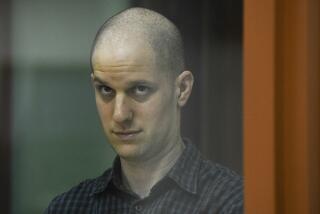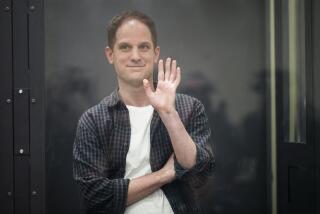Russian Oil Tycoon’s Trial to Open Today
- Share via
MOSCOW — Mikhail Khodorkovsky, the charismatic young billionaire whose arrest on fraud and tax charges raised questions about the future of private business in Russia, goes on trial today in a case whose outcome could determine whether one of Russia’s biggest oil companies is driven into bankruptcy.
After months of political intrigue, the 41-year-old oil tycoon -- whose arrest last fall tarnished the international reputation of Russian President Vladimir V. Putin’s administration -- will face a panel of three judges in one of the most widely anticipated legal events of the nation’s post-Soviet era.
With the prospects of foreign investment and the rule of law hanging in the balance, the small Moscow courtroom is expected to be inundated with spectators, journalists and international observers.
Khodorkovsky, whose $15-billion fortune makes him the richest man in a country full of newly minted billionaires, faces charges that he swindled shareholders and the government out of more than $1 billion through a complex web of shell companies and offshore transactions that surrounded the creation of his business empire in the 1990s.
A separate $3.4-billion tax case against Yukos Oil, once headed by Khodorkovsky, threatens to plunge into bankruptcy a $33-billion company that only last year was poised to become one of the biggest energy enterprises in the world. Yukos officials said Tuesday that they had proposed a restructuring plan that would enable the company to pay the tax bill in increments without turning over its assets to the government.
But many analysts fear that Khodorkovsky’s case -- in which Putin’s ability to control the increasing political muscle of Russia’s wealthy oligarchs is at stake -- is much less likely to end favorably for the oil tycoon, who could face 10 years in prison.
“I can tell you that I fully expect my client to be found guilty,” the tycoon’s Canadian lawyer, Robert Amsterdam, said in an interview Tuesday. “This is not a trial, this is a show.”
Putin’s liberal critics in Russia are also pessimistic.
“The president of the Russian Federation paid for his personal hatred toward this young and handsome man, who dared to go into politics, with the complete destruction of the entire legal system in Russia,” said Dmitry Muratov, a liberal newspaper editor and member of a pro-democracy group, the 2008 Free Choice Committee.
Lawyers have complained that Khodorkovsky has been unfairly held without bail -- in a prison riddled with tuberculosis, AIDS and hepatitis -- for essentially economic crimes. They say officials have monitored his conversations with his lawyers, closed court hearings that should have been public and searched the offices of his defense attorneys.
“Let’s make it very clear: Khodorkovsky is a political prisoner, and these charges are part of an illegal campaign against him,” Amsterdam said.
Prosecutors have said Khodorkovsky and his co-defendant, business partner Platon Lebedev, engaged in massive fraud that siphoned profits away from shareholders and tax authorities.
Putin has compared the Yukos case to U.S. prosecution of executives of Enron Corp., and has insisted that he is not trying to renationalize the company or put it under the Kremlin’s control.
Russian officials appear to be caught between the impulse to assert authority over ambitious businessmen like Khodorkovsky -- who was funding opposition parties, talking of running for office and holding discussions about selling a big stake in Yukos to a foreign oil company -- and the need to ease investor concerns at a time when Yukos’ tumbling stock is dragging down the rest of the Russian market.
“On the one hand, the Kremlin cannot allow Khodorkovsky’s acquittal ... for the next morning, all newspapers will be saying that the Kremlin yielded to the oligarchs,” said Liliya Shevtsova, an analyst with the Carnegie Moscow Center. “On the other hand, the Kremlin must prove both to Russian businessmen and to the West that there is justice in Russia.”
In any case, the Yukos prosecution already has served as a message, she added: “Businessmen either pull out of Russia, or if they choose to stay, they fully recognize the Kremlin’s right to dictate the rules of the game to them.”
Some analysts believe that Khodorkovsky may be allowed to strike a deal for his freedom in exchange for giving up his stake in Yukos, a scenario that raises the question of whether the government would seek to take over the company.
Yukos officials have warned that, with a court-ordered ban on the sale of assets, the company is unable to liquidate the resources necessary to pay its tax debt on time and could face bankruptcy. Yukos spokesman Alexander Shadrin said the company had presented several proposals for restructuring the tax debt that would enable the company to meet its obligations.
A hearing on the tax case, scheduled for Friday, could make the outcome clear, Shadrin said.
“If no major progress is made [before the hearing], then after Friday the bankruptcy procedure could well be launched,” he said. “Namely, the seizure of the company’s assets for tax enforcement.”
Such a result would be a stunning outcome for a company that had become one of the most successful and transparent in Russia’s transition to a market economy. But Shevtsova said the government’s economic goals might be as important as its political aims.
“One of the matters at hand is replacing Yukos’ owner and transferring the moneymaking oil company into convenient hands,” she said. “Therefore, it would be unwise to rule out the possibility of an economic annihilation of Yukos as a legal entity.... In any case, it will not have the same owners, that’s for sure.”
Alexei V. Kuznetsov of The Times’ Moscow Bureau contributed to this report.
More to Read
Sign up for Essential California
The most important California stories and recommendations in your inbox every morning.
You may occasionally receive promotional content from the Los Angeles Times.













